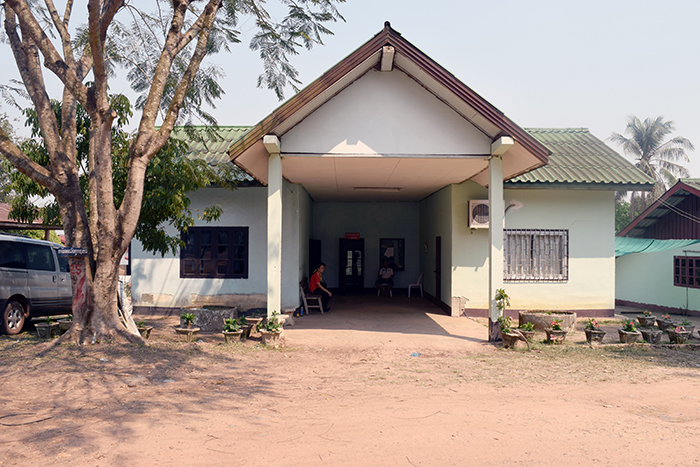
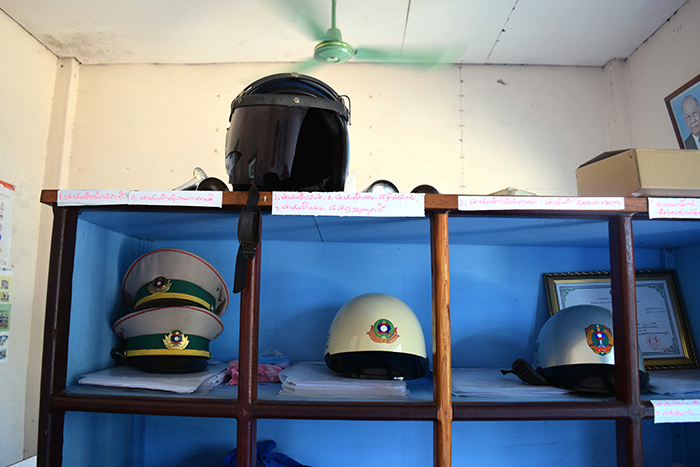
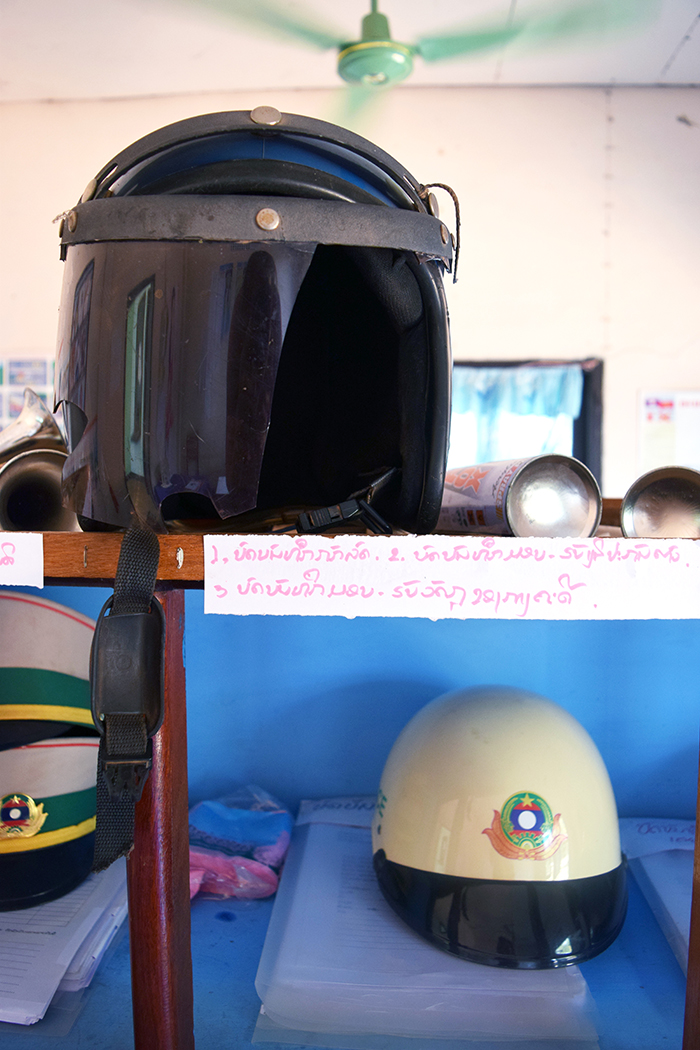
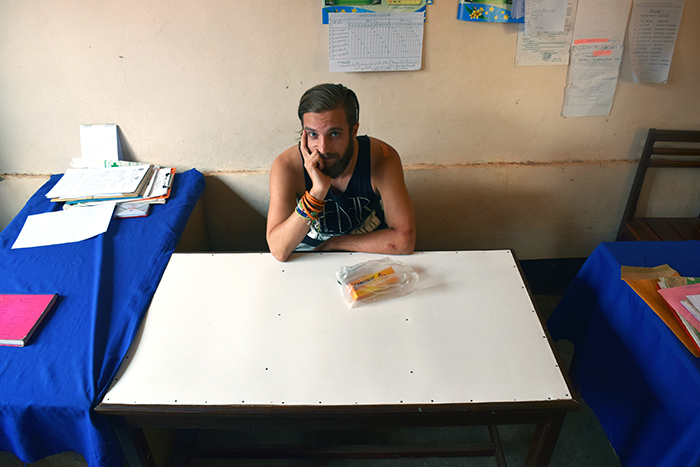
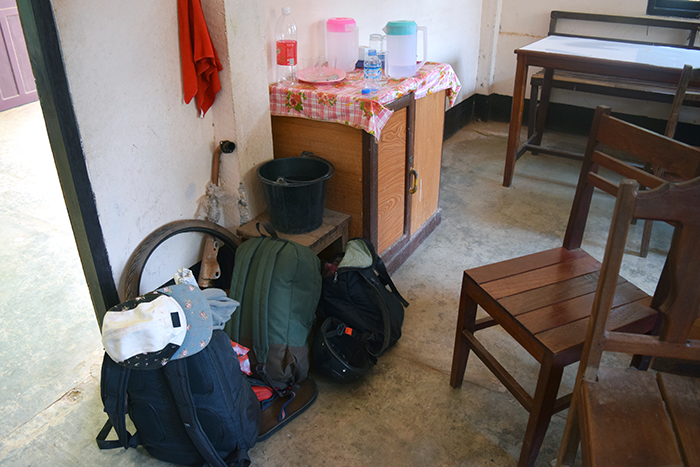
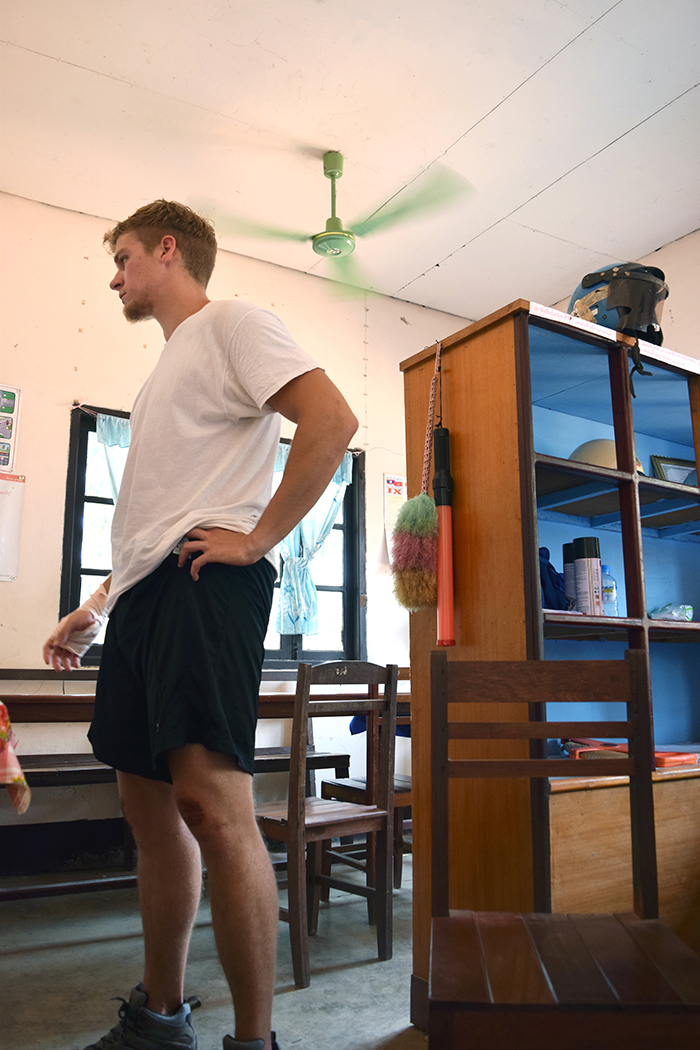
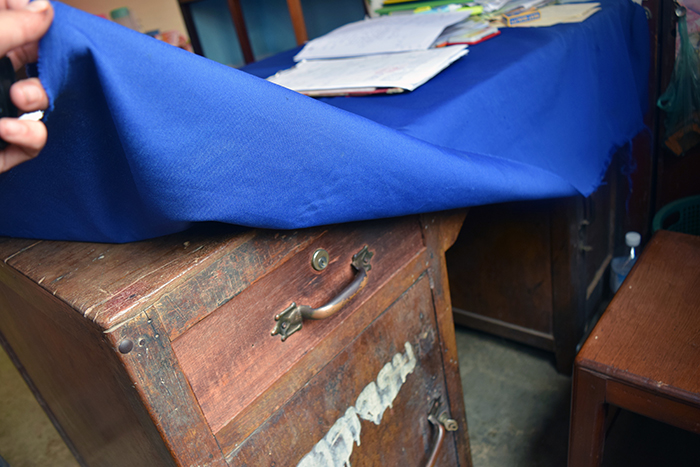
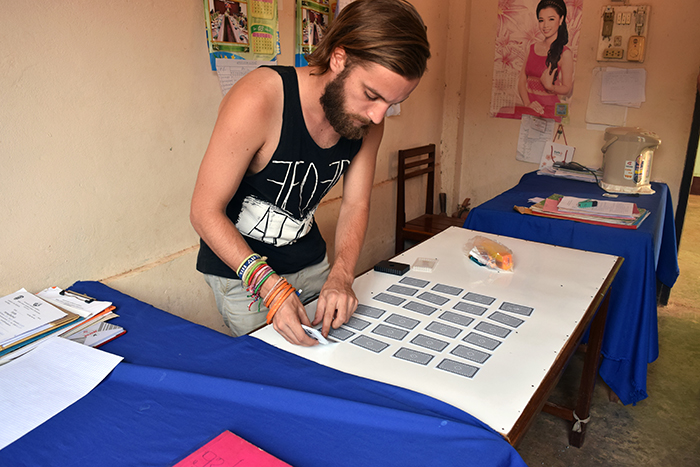
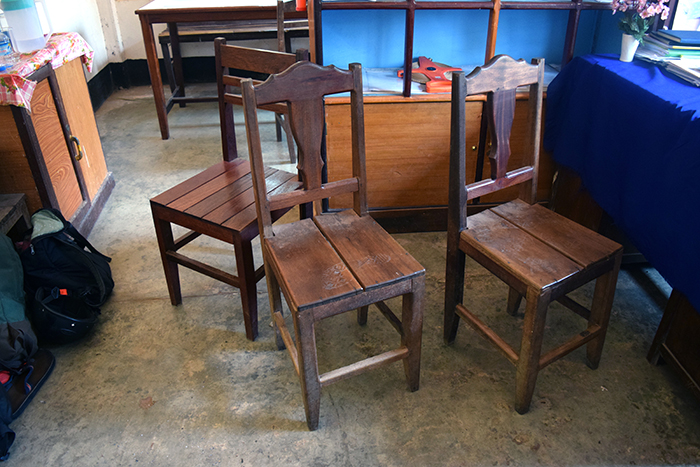
Location: Phonhong District, Laos
When we arrived at the police station, a one-story complex surrounded by thick, low concrete fences, Jack, Cody, and I were filed out of the van and pointed to a rickety wooden bench half-shaded by the roof of a dirty stucco building. We dropped our backpacks into a pile. Jack and I sat on the bench and when we did, it wobbled so much Cody refused to join us for fear of it breaking. One of the police brought out a red plastic stool for him to sit on.
We were quiet, calm. I think we were mostly just too shellshocked and confused to freak out. The crash kept replaying in my head; the biker flying limply through the air and flopping to the ground. His face too flat against the pavement and his limbs splayed out like a child’s discarded doll. The blood spilling through his teeth, his bottom lip flopping to one side.
Is he okay? God, I hope he’s okay.
The cops were friendly and casual, which caused the whole situation to seem surreally routine. I figured we were just dealing with the slow police system in Laos; they probably had to double check some paperwork and then we could go. Copy our passports or something. It was hard communicating between parties; the language barrier had us speaking through wild hand gestures, shaking our heads when we didn’t understand and smiling apologetically. But even the fact that we were being held by the police wasn’t too intimidating. The station itself was really just a row of small buildings with awnings crafted from tarps and sticks.
There was a wooden garage where they kept vehicles, including a green military truck and several motorbikes, as well as a picnic table surrounded by an assortment of stools. The only toilet was behind the buildings and down a set of stone steps, past a rectangular, concrete platform similar to a basketball court and in the middle of a grass patch. It was surrounded by chickens and ducks and the ground around it was a mess of muddy feathers, grain feed, and bird shit. The bathroom itself was a two room, windowless wooden outhouse and each dark, dank stall was fitted with a plastic squatting toilet cover on a wood platform, a leaky tap, a plastic bucket filled with water, and a smaller bucket for scooping it out. There were no lights and when I first went to use it, I found the latch had broken off the door. Behind the toilet was a thin, broken bamboo fence that separated the complex from a swampy pond and the green fields beyond.
We waited for about forty-five minutes before one of the cops came out and called Jack inside the office. A few minutes later, another cop, a slender, smiling man with thinning hair, waved Cody and myself into the room and sat us on wooden chairs facing Jack across a table. We piled our backpacks into the corner. The head police officer, and the only one who seemed to totally lack a sense of humor, clutched Cody’s, Jack’s, and my passport in one hand. He was copying down our information into another ledger. He grimaced at the papers in front of him.
My eyes wandered around the green tile room. It held several desks, a set of shaky shelves where the cops kept helmets and personal belongings, and a couple unplugged electric floor fans. There was a kettle and several cups for water placed on a plastic, red-and-white checkered table cloth in one corner. The shutters (there was no glass on the windows) and door were open and the room was decorated with several large calendars with images of heavily made-up, smiling Laotian women wearing shiny, colorful dresses, their posed figures double the size of the date boards they complemented.
One of the officers had placed the biker’s broken helmet, the visor cut in half, on the top of the shelves, directly facing Jack.
Once we were all inside, settled into our respective “witness” and “perpetrator” positions, the cops took turns attempting to breach the communication barrier and the one that spoke limited English ended up translating their questions, which were both completely unrelated to the case and painfully uninteresting, in broken half-phrases.
How old? You like Laos? Where travel next? Where been so far? How meet?
One officer in particular, the smiley, wiry one that had brought Cody and I into the room and offered us chairs, took a liking to me. He asked if I was married, showed me photos of his family, and had Cody take several photos of us together on his phone. I felt awkward as he swiped through the images, pointing out his favorite, the one where we were both smiling most widely at the camera, his arm wrapped tightly around my shoulder. Afterwards, he kept offering me cigarettes.
More time passed. Cody’s scrapes were leaking pus through their thin gauze covers and it was attracting tiny, buzzing black flies. I could tell it was beginning to worry him. I was concerned about the sterilization of my wounds as well. That morning I’d had to rewrap my arm with the same beige band as the night before, even though my gash had bled through. We didn’t have any supplies to replace it. My forearm was swollen and sore, and I tried not to think too much about the dull brown stain on the bandage. One officer handed Cody some toilet paper to lay over his knees and protect him from the onslaught of bugs. It stuck to the shiny liquid oozing out of him.
A cop announced that Jack needed to visit the hospital to have his injuries checked out. He was escorted to one of the motorbikes in the garage. He wasn’t given a helmet for the ride. When he returned, he had a crinkly plastic baggie filled with similar supplies as the one Cody and I were given the day before: Amoxicillin, Panadol, and an orange tube of anti-inflammatory cream. He was still wearing the bandaid I’d placed on the cut on his shoulder earlier. He said the doctor had been concerned about the bruising on his stomach, hip, and thigh. She’d given him some unknown shot in one butt cheek. He’d also seen the biker in the hospital; the man was awake, sitting up and talking to a friend. His lip had been stitched up. He and Jack had met and the friend had taken a photo of the two together.
The biker was conscious and stable.
I didn’t watch a man die, today.
A wave of relief crashed over me and I let it wash through me, relaxing my body, gently releasing the tension I’d held all morning and afternoon.
Some of the cops began making eating motions toward us, spooning invisible soup and handfuls of rice into their mouths. But we all shook our heads; even though I hadn’t eaten since the previous morning, my stomach was too traumatized to feel hunger. After a few more attempts to ask if we wanted food, one cop locked our passports in a drawer of one of the desks and they all left. I stared at the desk in disbelief.
What the fuck are we doing here?
I couldn’t understand it. It had been several hours and none of the officers had done anything productive in terms of our case. We’d already given them our witness statements at the scene. Jack was just a pedestrian that had been hit by a motorbike. It didn’t make any sense for them to hold our passports hostage like this. Cody and I weren’t even involved in the accident! Had we transformed from innocent bystanders to criminals when we ran out into the road to help the biker? When we offered information about the accident to the police? It was beginning to sink in that something was really, really wrong and that we might be in trouble.
But still the strange calm held down any visible panic. While we waited for the cops to come back, Cody read a New Yorker article on his phone and I taught Jack how to play Solitaire.
“Man, it’s already so late in the day. Do you think we can get to Vientiane in time for you to get in touch with that lady about your phone?” Jack asked me while I shuffled the deck. I was surprised that he was even thinking about my phone; in all the mess I’d completely forgotten it.
“No, and it doesn’t really matter. There’s kind of more going on that my totally replaceable smartphone.” I grinned as I said it. Jack was a salesman for Optus, the Verizon of Australia. I knew that if anyone would care about losing a phone it would be his tech-loving self.
“I’m sorry though.” He said. I glanced up from the cards and saw Jack looked genuinely sorry. I let out a small chuckle of unconcern. The phone just didn’t seem important in the moment and I couldn’t tell if he was just trying to forget the current situation by concentrating on something else for a little while.
“Seriously, it’s okay.”
The police were gone for over an hour. When they returned from their trip, joking and chatting away, they sat down around the picnic table in the garage and spread out a feast of noodles, fried pork belly, broth, and greens. I was taken aback by their nonchalance.
Are we actually just sitting here, wasting our time, because they’re having the longest lunch break possible?
I was fed up with it and wandered outside to question the young cop, find out what information could be translated through his seven months of English-speaking training. I pulled up a stool next to where he sat, his soup bowl empty except for soggy green dregs.
“Why are we here? How long do we have to stay here?”
“Ah, you and Cody can go at the end of day. But Mister Jack has to stay. He sleeps at the police station. I have to do my work.”
“But why?”
“I have to do more work. He can leave maybe tomorrow.”
Maybe tomorrow. Fuck.
“Cody and I aren’t leaving without Jack.”
He frowned.
“There is hotels in Vientiane. You go there.”
“No, we’re not leaving our friend.”
“Then you all sleep at police station.” He nodded, as if that was a sufficient response.
I nodded back and smiled, thanking him for the information and trying to appear unfazed by this news. When I returned to the guys and relayed everything I’d been told, the sheen of calm shattered. Jack, who had been lining up cards for another round of Solitaire, froze. He stared at me and I could see the recognition click behind his eyes, and a flicker of deep, gut-twisting fear.
“Just me?” He asked. I nodded, my brain buzzing with disbelief in its bobble head.
“What does he mean they have ‘police work’ to do? Jack didn’t do anything wrong. What else did he say? They can’t keep him here like this. He’s an Australian citizen. He has rights.” Cody said, looking up from his phone.
“I don’t know, man. This is a different country. The laws are different. The system is different.” I said.
“But they can’t do this. What other reasons did he give you? Why did he say they’re keeping him?”
“I already told you. Just that they have more police work to do. You can go ask again, if you want, but I don’t know what good it’ll do.”
Cody slowly pulled himself up off his chair, letting out a little groan. He was so sore he could barely walk. When we approached the cop, Cody repeated my questions in a louder, strained voice. He wasn’t happy when he received the same answers.
“Mister Jack has to stay. More police work to do.”
Police work. Like, an investigation? What does that mean?
“But why?” Cody said, his tone verging on aggressive. The cop’s almost apologetic smile disappeared and his eyes glittered with frustration. I panicked and gave Cody a light punch on the shoulder.
“Dude, stop it! We don’t want to piss these guys off.”
Cody shook his head and limped back inside. I smiled at the cop, whose eyes followed Cody as he left the table.
“Ah, sorry.” I said, shuffled away.
Back inside the office, Cody was furiously Googling information about criminal laws in Laos.
“They can’t keep us like this. They can’t make Jack stay. We have rights. We’re American citizens. Jack, call the Australian embassy.”
Jack picked up his phone and began Googling as well. We had limited data credit to work with, but Cody was able to get in touch with the American Embassy relatively quickly. The Australian Embassy proved a bit harder to contact. The emergency line went unanswered. Cody ended up asking the American embassy to ring them for us.
“We’re American citizens being detained at a police station a few hours from Vientiane. Not sure what village. Our friend was involved in a motorbike crash. He was a pedestrian and the biker was injured really badly. He’s in the hospital now. We’re not sure about his condition. The police are holding our passports hostage and won’t give us any information about what’s going on.”
Cody’s voice rang in my ears; was that really what was happening? It didn’t feel as serious as that sounded. That sounded like a horror story. The flies buzzed around us and through the open window I could hear the police joking over small cups of brownish liquid, which I assumed was tea.
We were told by the embassy that we were in a pretty bad spot. We should have never handed over our passports. It felt useless telling them that we didn’t have a choice in the moment, that they’d probably have arrested us anyway and confiscated our passports at the scene. We were calmly informed that there was no criminal law in Laos. The police dealt with accidents and disputes on a village-to-village basis, and mostly expected involved parties to hash out issues between themselves outside of the law. We were also warned that we were considered foreigners and that the Laotian justice system wouldn’t care that the biker had been speeding up the road way too fast, that his helmet hadn’t been fastened on properly; the overarching idea was that we were outsiders and if we had never been in Laos, the accident never would have happened. Jack would be considered, de facto, at fault.
It was soon after we learned this that three more people appeared at the scene: an older woman in a long, emerald Laotian skirt clutching a handful of tissues, a pot-bellied, balding middle-aged man with worried eyes, and a young man who kept playing with his Nokia phone. They sat outside the office on the wooden bench. I offered the woman my seat inside, but she refused it.
The group spoke in low voices to the officers. We could hear the word “farang” or “outsider” being tossed around by the woman, whose eyes were red and watery, as if she’d been crying. The middle-aged man spoke a little English and came inside, asked us a few brief questions about America and Australia.
The Australian embassy’s translator asked us to hand the phone to the police chief. They spoke for a long time before the phone was given back to Jack. Cody and I decided to grab some food while Jack took the call.
We ate at a noodle soup stand beside the police station. I shoveled the chunks of fried pork and thin white noodles down, the hot broth burning my tongue. The food sat heavy in my stomach.
When we returned to the office, the first thing I noticed was the mood change. The intensity in the station had shifted from low-key quiet to an uncomfortable, tense hush. Jack was still sitting on the bench but across the table were the three strangers, all the cops we’d already met, as well as three new officers in different uniforms embellished with shiny gold badges and colorful cloth stripes to distinguish rank.
Jack told us in a low whisper that he’d been ambushed as soon as we’d left. The biker’s wife had burst out sobbing, shouting “farang” and pointing at him. She said the biker had fallen back unconscious in the hospital and the family wanted compensation for the accident. The outlook was bad. The embassy had told Jack not to ask how much money they wanted. They weren’t sure if the man had actually taken a turn for the worse - the family could just be using that information to scare him. Whatever he did, he should not admit any fault. The embassy was going to call the hospital, but it was getting close to 5PM. The police station would close soon. Hopefully they could get all the information before the day was out, but it looked unlikely.
My stomach dropped. “What did they say would happen if they don’t get the information in time?”
“The police would keep my passport and that I need to get to Vientiane as soon as possible so that they can work with me to get it back.”
“How long do they think that could take?”
Jack gulped. “Well, they don’t know. It’s Friday and Monday is a public holiday so they won’t be able to get any information from the hospital until at least Tuesday. And they can’t do anything or advise me to do anything until they know exactly how bad the biker’s situation is.”
“Right.”
At exactly 5PM, the police captain handed Jack a photocopy of his passport and walked us to the highway, where he flagged down a bus headed to Vientiane. We left Nakam and the station behind without any more information, just a promise of a phone call from the Australian embassy the next afternoon.